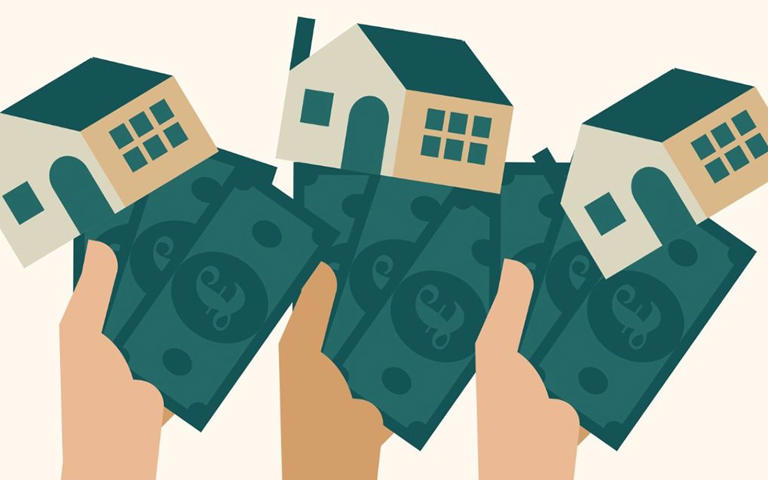Average asking rents outside London have hit another new record of £1,126 per calendar month according to Rightmove.
This figure, for the end of the second quarter of the year, is up 3.5 per cent on the first quarter by 11.8 per cent compared to summer 2021.
This increase means that rents outside of London are rising at the highest annual rate Rightmove has ever recorded in 16 years of reporting. Rents have now risen by 19 per cent – or an average of £177 – since the pandemic started just over two years ago.
By contrast, it took eight years pre-pandemic to reach the same level of growth, illustrating the rapid rise in asking rents since the start of the Covid outbreak. This quarter’s 3.5 per cent jump is the second highest quarterly rise in 10 years.
Rents in the capital also continue to rise as London reaches a new record average asking rent of £2,257 pcm this quarter. Annual growth in asking rents in London is now at 15.8 per cent, the fastest ever rate of any region.
Rising rents continue to be driven by a shortage of available rental stock, with low volumes struggling to meet high tenant demand over the past two years.
Although there is still a shortage of available homes to rent, there continues to be signs of this improving. The number of new rental listings is up eight per cent since the start of the year. June saw the highest number of new rental listings coming to market of any month this year so far.
Despite these signs, Rightmove reports that available rental stock is still down 26 per cent compared to last year’s levels, while demand is up six per cent, which means competition between tenants remains extremely fierce.
As high tenant demand continues to overtake last year’s exceptional levels, and available rental stock is slow to recover, the portal now expects average asking rent growth to reach eight per cent by the end of the year, up from five per cent predicted at the start of the year.
Affordability analysis from Rightmove shows that due to historically low interest rates, average mortgage payments on properties with two-bedrooms or fewer have risen by 13 per cent in the last 10 years, while equivalent rental payments on the same properties have risen by 40 per cent.
Despite challenges such as navigating legislation changes and potential updates to EPC requirements, more landlords are planning to expand their portfolio than reduce it, a sign of confidence in the market. A third of landlords recently surveyed said they plan to expand their portfolio during the next 12 months compared with only one in nine who plan to reduce the number of homes they rent out.
Rightmove’s Director of Property Science Tim Bannister adds: “The story of the rental market continues to be one of high tenant demand but not enough available homes to meet that demand. Last year we saw exceptional numbers of tenants looking to move and this year we have seen no let-up in this trend.
“Whilst stock levels are beginning to improve, with June seeing the highest number of new rental listings coming to market so far this year, the wide gap that has been created between supply and demand over the last two years will take time to narrow. Until then, this imbalance will continue to support asking rent growth.”
First-time buyers hit by surge in rents and house prices
First-time buyer house prices and rents have risen three times faster in the two years since the pandemic than before Covid hit as a property boom pushes property ownership further out of reach.
Monthly rental payments are rising at the fastest rate ever recorded, according to Rightmove – increasing by 17pc since 2020, compared to 5pc in the two years before that. Wages rose by 14pc in the same period, meaning income has failed to keep up.
The average 10pc deposit now stands at £22,493, 13pc higher than two years ago, Rightmove found. Average monthly mortgage payments have climbed 22pc.
A new first-time buyer now typically pays £973 a month based on the average mortgage rate, up £173. In the previous two years the increase was just £41.
Tim Bannister, of Rightmove, said that chasing soaring house prices had put first-time buyers at a disadvantage if they were unable to live with parents or family members while saving.
The average monthly rental payment is up £128 over the last two years, with a tax crackdown on landlords driving many out of the market and reducing supply.
Fewer than half (43pc) said they hoped to be able to afford a home within the next three years. Two thirds of respondents had already started saving towards a deposit, the survey found.
However, Rightmove said demand for first-time buyer properties is up by 35pc compared to 2019, suggesting many are still determined to get on the ladder despite stretched affordability.
Mr Bannister said: “We understand how difficult this challenge can be, and something we’ve seen more of over the last couple of years, particularly with working from home becoming more common, is people looking further away or at a greater number of different areas when looking to move, to see what is available within their budget.
“Those that have been able to save up a deposit are now facing rising interest rates when considering what they can afford to repay each month.
“Given the economic uncertainty at the moment, first-time buyers may seek some financial certainty by locking in a longer fixed-rate mortgage term now, before interest rates rise again.”

